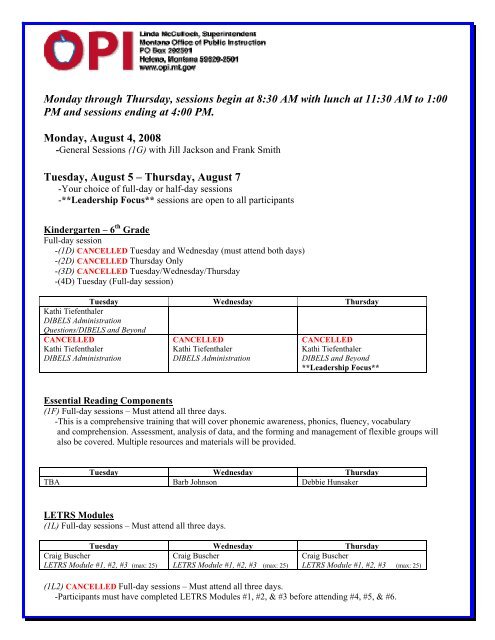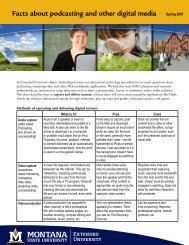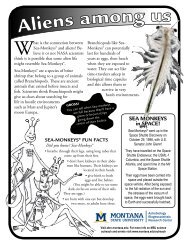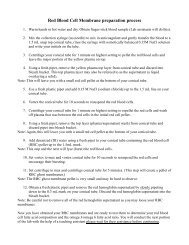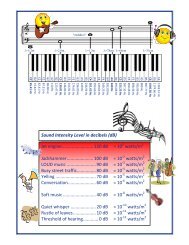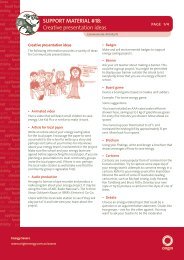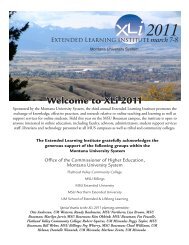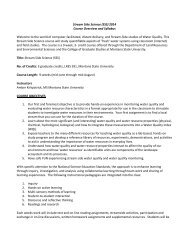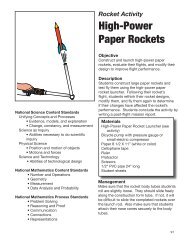Monday through Thursday, sessions begin at 8:30 AM with lunch at ...
Monday through Thursday, sessions begin at 8:30 AM with lunch at ...
Monday through Thursday, sessions begin at 8:30 AM with lunch at ...
Create successful ePaper yourself
Turn your PDF publications into a flip-book with our unique Google optimized e-Paper software.
<strong>Monday</strong> <strong>through</strong> <strong>Thursday</strong>, <strong>sessions</strong> <strong>begin</strong> <strong>at</strong> 8:<strong>30</strong> <strong>AM</strong> <strong>with</strong> <strong>lunch</strong> <strong>at</strong> 11:<strong>30</strong> <strong>AM</strong> to 1:00<br />
PM and <strong>sessions</strong> ending <strong>at</strong> 4:00 PM.<br />
<strong>Monday</strong>, August 4, 2008<br />
-General Sessions (1G) <strong>with</strong> Jill Jackson and Frank Smith<br />
Tuesday, August 5 – <strong>Thursday</strong>, August 7<br />
-Your choice of full-day or half-day <strong>sessions</strong><br />
-**Leadership Focus** <strong>sessions</strong> are open to all participants<br />
Kindergarten – 6 th Grade<br />
Full-day session<br />
-(1D) CANCELLED Tuesday and Wednesday (must <strong>at</strong>tend both days)<br />
-(2D) CANCELLED <strong>Thursday</strong> Only<br />
-(3D) CANCELLED Tuesday/Wednesday/<strong>Thursday</strong><br />
-(4D) Tuesday (Full-day session)<br />
Tuesday Wednesday <strong>Thursday</strong><br />
K<strong>at</strong>hi Tiefenthaler<br />
DIBELS Administr<strong>at</strong>ion<br />
Questions/DIBELS and Beyond<br />
CANCELLED<br />
K<strong>at</strong>hi Tiefenthaler<br />
DIBELS Administr<strong>at</strong>ion<br />
CANCELLED<br />
K<strong>at</strong>hi Tiefenthaler<br />
DIBELS Administr<strong>at</strong>ion<br />
CANCELLED<br />
K<strong>at</strong>hi Tiefenthaler<br />
DIBELS and Beyond<br />
**Leadership Focus**<br />
Essential Reading Components<br />
(1F) Full-day <strong>sessions</strong> – Must <strong>at</strong>tend all three days.<br />
-This is a comprehensive training th<strong>at</strong> will cover phonemic awareness, phonics, fluency, vocabulary<br />
and comprehension. Assessment, analysis of d<strong>at</strong>a, and the forming and management of flexible groups will<br />
also be covered. Multiple resources and m<strong>at</strong>erials will be provided.<br />
Tuesday Wednesday <strong>Thursday</strong><br />
TBA Barb Johnson Debbie Hunsaker<br />
LETRS Modules<br />
(1L) Full-day <strong>sessions</strong> – Must <strong>at</strong>tend all three days.<br />
Tuesday Wednesday <strong>Thursday</strong><br />
Craig Buscher<br />
LETRS Module #1, #2, #3 (max: 25)<br />
Craig Buscher<br />
LETRS Module #1, #2, #3 (max: 25)<br />
Craig Buscher<br />
LETRS Module #1, #2, #3 (max: 25)<br />
(1L2) CANCELLED Full-day <strong>sessions</strong> – Must <strong>at</strong>tend all three days.<br />
-Participants must have completed LETRS Modules #1, #2, & #3 before <strong>at</strong>tending #4, #5, & #6.
Tuesday Wednesday <strong>Thursday</strong><br />
CANCELLED<br />
Courtney Peterson<br />
LETRS Module #4, #5, #6 (max: 25)<br />
CANCELLED<br />
Courtney Peterson<br />
LETRS Module #4, #5, #6 (max: 25)<br />
CANCELLED<br />
Courtney Peterson<br />
LETRS Module #4, #5, #6 (max: 25)<br />
RTI – Open to All Participants<br />
Full-day <strong>sessions</strong> – Can <strong>at</strong>tend any combin<strong>at</strong>ion of Tuesday, Wednesday or <strong>Thursday</strong> <strong>sessions</strong>.<br />
<strong>Monday</strong> Tuesday Wednesday <strong>Thursday</strong><br />
(1R) Tara Ferriter-Smith (2R) Mike Vanderwood<br />
Montana RTI Project Implement<strong>at</strong>ion of RTI:<br />
<strong>AM</strong> – Overview of the Moving Beyond the Basics<br />
Montana RTI Project; PM –<br />
Panel Discussion <strong>with</strong><br />
Montana RTI Schools<br />
CANCELLED<br />
(4R) Judy Elliot<br />
RTI Keynote Address –<br />
Introduction to RTI<br />
(3R) Mike Vanderwood<br />
RTI and M<strong>at</strong>h: Instructional<br />
Str<strong>at</strong>egies and Assessment<br />
RTI Team Training<br />
No traditional registr<strong>at</strong>ion - Full-day <strong>sessions</strong> are by invit<strong>at</strong>ion only.<br />
Tuesday Wednesday <strong>Thursday</strong><br />
Denise Conrad<br />
RTI School Team Module Training<br />
Denise Conrad<br />
RTI School Team Module Training<br />
Denise Conrad<br />
RTI School Team Planning Day<br />
Kindergarten – 3 rd Grade<br />
Half-day <strong>sessions</strong> – Each session will repe<strong>at</strong> in the afternoon.<br />
Tuesday Wednesday <strong>Thursday</strong><br />
(IA/IP) Brigid Fitzp<strong>at</strong>rick<br />
Enhancing Vocabulary Knowledge<br />
for a Variety of Learners<br />
**Indian Educ<strong>at</strong>ion For All<br />
Focus**<br />
(AA/ AP) Annie Edgar & Reba<br />
Strom<br />
Sens<strong>at</strong>ional Teaching Str<strong>at</strong>egies and<br />
Ideas<br />
(BA – morning only) Jill Jackson<br />
Instructional Leadership and<br />
Coaching<br />
**Leadership Focus**<br />
(BP – afternoon only) Jill Jackson<br />
Vocabulary and Comprehension<br />
**Leadership Focus**<br />
(CA/CP) Connie Colbaugh<br />
Effective Centers<br />
(DA/DP) Neila Solberg<br />
Writing About Reading, Focusing on<br />
Vocabulary and Summary Writing<br />
(JA/JP) Angela Przychodzin<br />
Explicit “Big 5” Reading<br />
Instructional Str<strong>at</strong>egies, and Specific<br />
Research-Valid<strong>at</strong>ed Reading and<br />
Vocabulary Programs, K-3<br />
(KA/KP) Wristine Senecal<br />
Study Groups<br />
**Leadership Focus**<br />
(LA/LP) Neila Solberg<br />
Sentence Mastery and Constructed<br />
Responses<br />
(QA/QP) Gwen Poole<br />
Flexible Groups/ Differenti<strong>at</strong>ed<br />
Instruction<br />
(RA/RP) Stephanie Atencio &<br />
K<strong>at</strong>ie Leitheiser<br />
Team Collabor<strong>at</strong>ion and Walk to<br />
Read Interventions<br />
(max: 40)<br />
(SA/SP) Barbara Johnson<br />
Embedding Vocabulary <strong>with</strong> Read<br />
Alouds<br />
(max: 40)<br />
CANCELLED<br />
(TA/TP) Rhonda Crowl<br />
Enhancing Classroom Reading<br />
Instruction to Support Struggling<br />
Readers
4 th - 9 th Grade<br />
Half-day <strong>sessions</strong> – Each session will repe<strong>at</strong> in the afternoon.<br />
Tuesday Wednesday <strong>Thursday</strong><br />
CANCELLED<br />
(UA/UP) Frances Bessellieu<br />
(MA/MP) Rhonda Crowl<br />
Interventions<br />
Supporting Struggling<br />
Readers During Content<br />
Area Instruction<br />
(EA/EP) Angela Przychodzin<br />
Developing Practical Vocabulary<br />
and Comprehension Routines to<br />
Enhance Existing Basal Programs<br />
**LeadershipFocus**<br />
(FA/FP) Frank Smith<br />
Comprehension<br />
(GA/GP) Yolanda Westerberg<br />
The “How-To’s” to Six Traits<br />
Writing + 1, grades 4-9<br />
(HA/HP) Kim Marcum<br />
Summary and Questioning<br />
(NA/NP) Yolanda Westerberg<br />
Reading and Writing in the Content<br />
Areas<br />
(OA/OP) Connie Colbaugh<br />
Effective Centers/Differenti<strong>at</strong>ed<br />
Instruction<br />
(PA/PP) Kim Marcum<br />
Study Skills<br />
**Leadership Focus**<br />
(VA/VP) Wristine Senecal<br />
Study Groups<br />
**Leadership Focus**<br />
(WA/WA) Karol Gustin & Rachel<br />
Bright<br />
Success for all Students: Lessons<br />
Learned from a Blue-Ribbon School<br />
**Leadership Focus**<br />
(XA/XP) Mary McGarry Burke &<br />
Phyllis Dorington<br />
Effective Reading Practices in<br />
Middle Schools<br />
**Leadership Focus**<br />
Session Descriptions<br />
Active Engagement and Effective Teaching Practices: A Bridge from Teaching to Learning (<strong>Monday</strong> Keynote <strong>with</strong><br />
Frank Smith) Given the increasing demands placed upon today’s classroom teachers, it is crucial th<strong>at</strong> our schools<br />
implement instructional techniques th<strong>at</strong> are effective for all students. Active engagement on the part of students during the<br />
instructional sequence helps to promote learner success. It also produces more efficient instruction and a more positive<br />
learning environment for students and teachers. This session will focus on ways in which instructors can increase active<br />
engagement and improve instructional techniques and thereby improve the learning environment for all children.<br />
DIBELS Administr<strong>at</strong>ion Questions/DIBELS and Beyond (<strong>with</strong> K<strong>at</strong>hi Tiefenthaler) DIBELS, Dynamic Indic<strong>at</strong>ors of<br />
Basic Early Literacy Skills is an assessment used to determine the level of skill applic<strong>at</strong>ions of early readers. The first part of<br />
the session will be an introduction into the basics of DIBELS and an opportunity to ask questions on its administr<strong>at</strong>ion. The<br />
second part of the session will deal <strong>with</strong> the question…. “Now wh<strong>at</strong> do I do <strong>with</strong> this inform<strong>at</strong>ion?” To answer th<strong>at</strong><br />
question, we will be “digging deeper,” forming flexible groups and planning differenti<strong>at</strong>ed instruction to meet student needs.<br />
Participants will need to bring: DIBELS d<strong>at</strong>a, any diagnostic d<strong>at</strong>a being used, 1 teacher edition, and intervention<br />
m<strong>at</strong>erial.<br />
DIBELS Administr<strong>at</strong>ion (<strong>with</strong> K<strong>at</strong>hi Tiefenthaler) CANCELLED DIBELS, Dynamic Indic<strong>at</strong>ors of Basic Early Literacy<br />
Skills is an assessment used to determine the level of skill applic<strong>at</strong>ions of early readers. This session will be an introductory<br />
training on how to administer each of the probes for early detection reading difficulties. Each DIBELS measure has<br />
standardized administr<strong>at</strong>ion and scoring procedures so th<strong>at</strong> the scores have meaning <strong>with</strong> reliability and validity. Please bring<br />
your stopw<strong>at</strong>ch or timer to this session.<br />
DIBELS and Beyond (<strong>with</strong> K<strong>at</strong>hi Tiefenthaler) CANCELLED We have DIBELed, now wh<strong>at</strong>? This session will give the<br />
participants a chance to look <strong>at</strong> DIBELS, analyze the d<strong>at</strong>a it offers, and determine if there is a need to dig deeper. Students<br />
will be identified benchmark, str<strong>at</strong>egic, and intensive…Then comes the question…”Now wh<strong>at</strong> do I do <strong>with</strong> this<br />
inform<strong>at</strong>ion?” To answer th<strong>at</strong> question, we will be “digging deeper,” forming flexible groups and planning differenti<strong>at</strong>ed<br />
instruction to meet student needs. Participants will need to bring: DIBELS d<strong>at</strong>a, any diagnostic d<strong>at</strong>a being used, 1 teacher<br />
edition, and intervention m<strong>at</strong>erial.
LETRS (<strong>with</strong> Craig Busher) LETRS Modules 1, 2, and 3. LETRS (Language Essentials for Teachers of Reading and<br />
Spelling) are professional development modules cre<strong>at</strong>ed by Dr. Louisa Mo<strong>at</strong>s. Module 1: The Challenge of Learning to Read<br />
discusses why reading is a n<strong>at</strong>ional priority, how good readers read, the components of effective reading instruction, and why<br />
some children have difficulty learning to read. Module 2: The Speech Sounds of English: Phonetics, Phonology, and<br />
Phoneme Awareness reveals the phonological processor, discusses the importance of phonology in learning to read, and<br />
examines the 43 speech sounds. Module 3: Spellography for Teachers: How English Spelling Works covers these big ideas:<br />
letters and letter combin<strong>at</strong>ions, syllables and sound position, letter p<strong>at</strong>terns, meaning, and word origin. Each module lasts one<br />
day and is appropri<strong>at</strong>e for K - 9 teachers.<br />
LETRS Language Essentials for Teachers of Reading and Spelling (<strong>with</strong> Courtney Peterson) CANCELLED<br />
(Language Essentials for Teachers of Reading and Spelling) are professional development modules cre<strong>at</strong>ed by Dr. Louisa<br />
Mo<strong>at</strong>s. After <strong>at</strong>tending the first three modules, participants are invited to <strong>at</strong>tend Modules 4, 5, and 6. These modules build<br />
on previously introduced concepts such as autom<strong>at</strong>icity, the reading brain, and why some people struggle to learn to read.<br />
Modules 4, 5, and 6 complete the overview of the essential components of reading instruction. In Module 4, The Mighty<br />
Word: Building Vocabulary and Oral Language, participants will define vocabulary knowledge and will learn many<br />
instructional techniques to enhance vocabulary instruction in the classroom. Module 5 focuses on Fluency. Titled Getting<br />
Up to Speed: Developing Fluency, this module will explore the difference between autom<strong>at</strong>icity and fluency. Participants<br />
will review the general guidelines for fluency instruction and the most effective practices to use to build fluency. Fluency is<br />
also discussed as the critical "bridge" to comprehension. Finally, Module 6, Digging for Meaning: Teaching Text<br />
Comprehension outlines text comprehension instruction and its critical role in reading for students in all grades. Each session<br />
lasts one day and is appropri<strong>at</strong>e for teachers of grades K - 9.<br />
Instructional Leadership and Coaching (<strong>with</strong> Jill Jackson) In this interactive session we will focus on “real life”<br />
examples of wh<strong>at</strong> it takes to build and sustain a strong literacy system. The system approach focuses on building a strong link<br />
between teacher quality and performance and the overall health of the school. When “business as usual” is first-class teacher<br />
and student performance, high levels of collabor<strong>at</strong>ion, habitual d<strong>at</strong>a analysis, all led by a visionary literacy leader and coach,<br />
then we know we’re on the right track! We’ll focus on all of the necessary elements th<strong>at</strong> are “must haves” as you implement<br />
a literacy system <strong>at</strong> your school or district and you will leave <strong>with</strong> very clear next steps tailored specifically for your site.<br />
Vocabulary and Comprehension (<strong>with</strong> Jill Jackson) Most of us have read the research on increasing the effectiveness of<br />
vocabulary and comprehension and recognize the important tenets of th<strong>at</strong> instruction. So, why are we not seeing a huge<br />
increase in our students’ overall vocabulary or their ability to synthesize all of the reading str<strong>at</strong>egies into their independent<br />
reading? We will take a look <strong>at</strong> wh<strong>at</strong> we know works in the classroom for all students and spend a significant amount of time<br />
looking <strong>at</strong> wh<strong>at</strong> excellent instruction and delivery looks like when we implement “wh<strong>at</strong> works” in the area of vocabulary and<br />
comprehension.<br />
Building Vocabulary and Comprehension in Grades 4-9 (<strong>with</strong> Frank Smith) The effects of insufficient reading skills are<br />
not just confined to the language arts classroom. Students who lack appropri<strong>at</strong>e literacy abilities are <strong>at</strong> a gre<strong>at</strong>er risk for not<br />
performing proficiently in content areas such as science, social studies and m<strong>at</strong>hem<strong>at</strong>ics. This session will focus on<br />
instruction th<strong>at</strong> improves vocabulary and comprehension for all subject areas. Special emphasis will be given to specific<br />
comprehension str<strong>at</strong>egies, scaffolding techniques, vocabulary development, and the elimin<strong>at</strong>ion of tool skill deficiencies th<strong>at</strong><br />
may hamper understanding.<br />
Managing Intervention Instruction for Student Success, 4-9 (<strong>with</strong> Frances Bessellieu) This session is designed to help<br />
4-9 teachers, coaches and principals identify the critical components necessary for cre<strong>at</strong>ing an effective intervention plan for<br />
even the most fragile students. Setting up and teaching flexible groups, scheduling, time alloc<strong>at</strong>ion, monitoring, professional<br />
development, coaching and leadership will be covered. Motiv<strong>at</strong>ional techniques for older students who need additional<br />
incentives will be presented. Several tools will be dissemin<strong>at</strong>ed to help schools improve instructional planning for students<br />
who require the most support.<br />
Robust Vocabulary Instruction Through Read Alouds (<strong>with</strong> Barb Johnson) Let's read stories and increase vocabulary<br />
acquisition for students. Participants will learn a process for embedding vocabulary instruction in read alouds including<br />
picture books, chapter books, and short stories. We will practice robust vocabulary instruction <strong>through</strong> fast mapping.<br />
Participants will cre<strong>at</strong>e examples of their own and also practice the process. Leaving the session <strong>with</strong> specific examples th<strong>at</strong><br />
can be used in the fall will be an added bonus.
Enhancing Classroom Reading Instruction to Support Struggling Readers, K-3 (<strong>with</strong> Rhonda Crowl) CANCELLED<br />
If you have ever had a struggling reader in your classroom then this is the session for you! You will learn about proven<br />
research based techniques and tools for tightening up your classroom reading instruction. You will learn how to better focus<br />
the whole group instruction from your basal reading programs, and also examine the processes behind differenti<strong>at</strong>ed<br />
instruction and flexible grouping to meet the specific needs of your students. You will leave this session <strong>with</strong> ready-to-use<br />
techniques and m<strong>at</strong>erials to help you focus your reading instruction in all areas of reading, as well to provide all of your<br />
students <strong>with</strong> additional guided practice and repetition which research st<strong>at</strong>es is critical for skill mastery. You will need to<br />
bring one teachers edition for the core program you are currently using.<br />
Successful Small Groups (<strong>with</strong> Stephanie Atencio and K<strong>at</strong>ie Leitheiser) Do you struggle <strong>with</strong> knowing exactly wh<strong>at</strong> to<br />
teach during small group instruction? Or how to group your students most effectively? Come learn how to pinpoint<br />
instructional str<strong>at</strong>egies for every student. We will focus on CORE phonics survey, Orton Gillingham, fluency reads and<br />
motiv<strong>at</strong>ional approaches to make your readers soar. We will share our personal experiences and collabor<strong>at</strong>ive str<strong>at</strong>egies so<br />
th<strong>at</strong> you too can have successful small groups.<br />
Supporting Struggling Readers During Content Area Instruction, 4-9 (<strong>with</strong> Rhonda Crowl) CANCELLED If you have<br />
ever had a struggling reader in your classroom then this is the session for you! You will learn about proven research based<br />
techniques and tools for enhancing your classroom instruction. You will learn how to better focus the whole group instruction<br />
from your content area programs to support students who struggle <strong>with</strong> reading, and examine the processes behind<br />
differenti<strong>at</strong>ed instruction and flexible grouping to meet the specific needs of your students. You will leave this session <strong>with</strong><br />
ready-to-use techniques and m<strong>at</strong>erials to help you modify your content area instruction for struggling readers, as well to<br />
provide all of your students <strong>with</strong> additional guided practice and repetition which research st<strong>at</strong>es is critical for skill mastery.<br />
You will need to bring one teachers edition for the core program you are currently using.<br />
Developing Practical Vocabulary and Comprehension Routines to Enhance Existing Basal Programs (<strong>with</strong> Angela M.<br />
Przychodzin) This session will focus on building practical, explicit vocabulary and comprehension routines to enhance preexisting<br />
basal programs. Research-valid<strong>at</strong>ed programs for grades 4-9 and leadership guidance on supporting staff <strong>with</strong><br />
program enhancements and implement<strong>at</strong>ion will also be discussed.<br />
The Big 5 and Beyond (<strong>with</strong> Angela M. Przychodzin) Are you fortun<strong>at</strong>e enough to be able to purchase a new reading<br />
program or programs for next year? If not, how can you make your current program more explicit for students who need this<br />
level of support? This session will focus on a variety of explicit reading str<strong>at</strong>egies to enhance existing programs, as well as<br />
research-valid<strong>at</strong>ed reading and vocabulary programs for grades K-3.<br />
Reading and Writing in the Content Area, 4-12 (<strong>with</strong> Yolanda Westerberg) Demanding grade level content area<br />
reading and writing simply cannot be successfully taught using the same old approach as teaching a favorite novel. Students<br />
need to be taught the critical tools of inform<strong>at</strong>ional reading, writing, and thinking <strong>with</strong>in their content area classes. This<br />
session will explore classroom tested str<strong>at</strong>egies to ensure th<strong>at</strong> all students learn how to learn and write effectively. A<br />
particular focus will explore how teachers can intentionally develop their students’ vocabulary, comprehension, and summary<br />
writing skills.<br />
Literary Essays-Accessing the How To’s of Six +One Traits, 4-12 (<strong>with</strong> Yolanda Westerberg) Expanding on Solberg’s<br />
primary workshop, this powerful interactive session will provide classroom teachers <strong>with</strong> relevant teaching str<strong>at</strong>egies th<strong>at</strong><br />
will assist in raising the level of literary essays. In order for students to be ready for wh<strong>at</strong> they will encounter eventually<br />
when writing literary essays, we need to plan a sequence of opportunities th<strong>at</strong> will equip them by moving them step-by-step<br />
along a “gradient of difficulty” as they learn to write about reading accessing Six + One Traits<br />
Constructed Response (<strong>with</strong> Neilia Solberg) Many children’s first exposure to written response comes in third or fourth<br />
grade when they are assigned to read difficult texts “across the curriculum” about unfamiliar and conceptually challenging<br />
topics. Students are expected to take notes (something they may never have been taught to do) and then write a lengthy<br />
response (“in your own words”). Not surprisingly, some children are not prepared for so many new challenges all <strong>at</strong> once.<br />
Expanding on the ideas in Writing About Reading, this session will focus on specific characteristics of constructed response<br />
and the how-to’s of sentence styling.<br />
Writing About Reading (<strong>with</strong> Neilia Solberg) If we want children to be ready for wh<strong>at</strong> they will encounter eventually<br />
when writing literary essays, we need to plan a sequence of opportunities th<strong>at</strong> will equip them by moving them step-by-step<br />
along a “gradient of difficulty” as they learn to write about reading. Learn how to choose mini-lessons about character<br />
study, episodes or tiny moments in a story, settings and vocabulary. This session will focus on planning a unit of study for<br />
young readers and writers using picture books and core reading m<strong>at</strong>erials.
Study Groups (<strong>with</strong> Wristine Senecal) Looking for professional development resources and ideas th<strong>at</strong> are inform<strong>at</strong>ive,<br />
have practical classroom applic<strong>at</strong>ions and are MOTIVATING? This session will provide you <strong>with</strong> all th<strong>at</strong> and more. You<br />
will walk away <strong>with</strong> m<strong>at</strong>erials and resources to conduct study groups for Overcoming Dyslexia by Sally Shaywitz, M.D.,<br />
Bringing Words to Life by Isabel L. Beck, Margaret G. McKeown, and Linda Kucan (back by popular demand). Articles<br />
from American Educ<strong>at</strong>or will also be highlighted as resources for professional development <strong>sessions</strong> th<strong>at</strong> can occur right in<br />
your school!<br />
Differenti<strong>at</strong>ed Instruction/Flexible Groups (<strong>with</strong> Gwen Poole) Do you find it difficult to reach all of your students'<br />
needs? The variety of instructional needs <strong>with</strong>in one classroom is large and can feel overwhelming. Differenti<strong>at</strong>ed<br />
instruction and flexible grouping is possible <strong>at</strong> any grade level. This session will address how to m<strong>at</strong>ch instruction to meet<br />
the differing needs of your learners and how to manage those flexible groups.
The Essential Components of Reading (<strong>with</strong> Rhonda Crowl, Barb Johnson and Debbie Hunsaker) Course Overview:<br />
Participants will meet for six, three-hour <strong>sessions</strong> over the course of three days. The first session will be a general overview<br />
of scientifically-based reading research, the five components of reading, assessment, flexible grouping, and why children<br />
have difficulties learning to read. The following <strong>sessions</strong> will cover the five components of reading; Phonological<br />
Awareness, Phonics and Word Study, Vocabulary, Fluency, and Text Comprehension. Core program alignment, best<br />
practices, assessment, and small-group techniques will be outlined for each of the five components. Throughout all <strong>sessions</strong>,<br />
teachers will learn active particip<strong>at</strong>ion techniques to increase student engagement. Course Expect<strong>at</strong>ions: Course m<strong>at</strong>erials<br />
are provided. Participants are asked to bring general note taking supplies and teacher’s editions. There are many<br />
opportunities <strong>through</strong>out the course for participants to interact and discuss. We ask for your respectful particip<strong>at</strong>ion in these<br />
activities<br />
August 5 – Tuesday Morning – Rhonda Crowl / Session 1: The Big Five! – During this opening session, participants will<br />
receive a course overview and complete an introductory activity. After a brief description of current reading research, group<br />
members will read an article th<strong>at</strong> outlines the five components of reading. Assessment is a critical element of any reading<br />
program. Teachers will evalu<strong>at</strong>e their own assessment methodology and will share current assessment practices <strong>with</strong> the other<br />
participants. Effective grouping practices will be shared and discussed. Finally, the group will discuss the environmental and<br />
constitutional factors th<strong>at</strong> influence a child’s learning to read.<br />
August 5 – Tuesday Afternoon – Rhonda Crowl / Session 2: Phonological Awareness – Can You Hear Me Now?-<br />
Phonological Awareness is an umbrella term th<strong>at</strong> encompasses many areas of instruction in the primary classroom. Teachers will<br />
discover why it is important to know about phonological awareness and how it rel<strong>at</strong>es to l<strong>at</strong>er reading ability. We will start <strong>with</strong><br />
the Phonological Awareness continuum and discover how the core program addresses the continuum. The highest level of<br />
phonological awareness is phonemic awareness. The session will cover engaging techniques for teaching phonemic awareness<br />
and letter naming. At the end of the session participants will learn about assessing PA and addressing PA issues in small groups.<br />
August 6 – Wednesday – Barb Johnson / Sessions 3 and 4: Phonics and Word Study –Hoked on Foniks Wrkd for Me!<br />
Participants will define phonics and word study and will see its applic<strong>at</strong>ion to the K – 3 classroom. The present<strong>at</strong>ion will detail<br />
sound/spelling correspondences, the layers of language, and phonics instruction <strong>with</strong>in the core reading program. The purpose of<br />
decodable text, teaching multi-syllabic words, assessing phonics, using student writing samples to assess decoding, and<br />
addressing phonics gaps in small group will also be discussed.<br />
August 7 – <strong>Thursday</strong> – Debbie Hunsaker / Sessions 5 and 6: Fluency – To Prosody and Beyond! We use fluency as<br />
indic<strong>at</strong>or of overall reading ability, but our understanding of fluency needs to go beyond r<strong>at</strong>e to its connection to comprehension.<br />
Session participants will discover the many aspects of effective fluency instruction. We will detail why fluency is important,<br />
how and when it is included in the core reading program, and how monitoring fluency can reveal student success. A special<br />
focus will be fluency activities for small groups.<br />
Vocabulary – The Rich get Richer! – Our discussion will start <strong>with</strong> outlining wh<strong>at</strong> vocabulary is and why it is important for<br />
reading. Vocabulary is often included in the core reading program but instruction needs to be enhanced and supplemented.<br />
We’ll explore effective ways to build the three types of vocabulary instruction: Specific Word Instruction, Word Learning<br />
Str<strong>at</strong>egy Instruction, and Promoting Word Consciousness into every day, and participants will walk away <strong>with</strong> a variety of<br />
instructional str<strong>at</strong>egies to implement immedi<strong>at</strong>ely. The assessment of vocabulary and ELL/LEP issues will be woven <strong>through</strong>out<br />
the discussion.<br />
Text Comprehension – Th<strong>at</strong>’s Wh<strong>at</strong> Its All About! Comprehension instruction varies according to grade level but must start<br />
early and must include text structure, before, during, and after reading techniques, comprehension str<strong>at</strong>egies, and comprehension<br />
skills. We’ll look carefully <strong>at</strong> the influence of fluency and vocabulary on comprehension and how teachers can successfully<br />
assess comprehension.<br />
Wake Them Up! So You Can Teach Them: Effective Reading Practices in Middle School (<strong>with</strong> Mary McGarry Burke<br />
and Phyllis Dorrington) Not all middle students dive into the smorgasbord of learning, many are turned off and tuned out.<br />
They sit and w<strong>at</strong>ch the teacher perform <strong>with</strong> limited buy in. In this session we will go over the effective components<br />
involved in a successful, well taught lesson, while including planned academic engagement activities th<strong>at</strong> will motiv<strong>at</strong>e your<br />
students to think and particip<strong>at</strong>e, thus becoming more involved in each lesson. Students will learn in spite of themselves.<br />
When students are engaged in class, they think more, respond more and learn more. All of this has considerable impact on<br />
both listening and reading comprehension. You will leave <strong>with</strong> m<strong>at</strong>erials th<strong>at</strong> will remind you to use these methods, as well<br />
as m<strong>at</strong>erials to help you incorpor<strong>at</strong>e these into your daily teaching practices.<br />
Language! The Comprehensive Literacy Curriculum (<strong>with</strong> Mary McGarry Burke and Phyllis Dorrington) This<br />
session focuses specifically on Language! The Comprehensive Literacy Curriculum. It is an opportunity for Language<br />
teachers around the st<strong>at</strong>e to learn from each other, support each other and collabor<strong>at</strong>e together. Let’s share effective<br />
practices, helpful hints, roadblock remedies and more!
Success for All Students-Lessons Learned From a Blue Ribbon School (<strong>with</strong> Karol Gustin and Rachel Bright) This<br />
workshop will highlight the process of improvement and the story of student achievement made by Radley Elementary<br />
School and the East Helena School District in the last six years. We will share components we put into place including<br />
professional development, effective academic programs, grade level team meetings, and school-wide leadership teams.<br />
Effective Centers (K-3) (<strong>with</strong> Connie Colbaugh) Discover how primary students are achieving increased reading<br />
proficiency <strong>through</strong> appropri<strong>at</strong>e, independent practice. This hands-on session will include motiv<strong>at</strong>ional games, activities, and<br />
a plan for implementing effective centers in the classroom. The present<strong>at</strong>ion will focus on (1) a form<strong>at</strong> in which activities are<br />
explicitly taught and organized for independence (2) activity content th<strong>at</strong> m<strong>at</strong>ches individual students’ needs and is congruent<br />
<strong>with</strong> instruction, and (3) a system of accountability th<strong>at</strong> supports high student engagement.<br />
Effective Centers/Differenti<strong>at</strong>ed Instruction (4-9) (<strong>with</strong> Connie Colbaugh) Discover how teachers are meeting a variety<br />
of student needs <strong>through</strong> appropri<strong>at</strong>e, independent practice activities. This hands-on session will include motiv<strong>at</strong>ional games<br />
as well as a plan for implementing effective practice centers in the classroom. The present<strong>at</strong>ion will focus on (1) a form<strong>at</strong> in<br />
which activities are explicitly taught and organized for independence (2) activity content th<strong>at</strong> m<strong>at</strong>ches individual students’<br />
needs and is congruent <strong>with</strong> instruction, and (3) a system of accountability th<strong>at</strong> supports high student engagement.<br />
Sens<strong>at</strong>ional Teaching Str<strong>at</strong>egies and Ideas (<strong>with</strong> Annie Edgar and Reba Strom) Do you have days when only one or two<br />
of the same students answer teacher’s questions? Well, come in and learn techniques and str<strong>at</strong>egies to enhance student<br />
learning in the classroom, as well as transition time.<br />
Effective Instructional Str<strong>at</strong>egies for Struggling Leaners (<strong>with</strong> Frances Bessellieu) Like any other popul<strong>at</strong>ion of learners<br />
<strong>with</strong> academic difficulties, struggling learners require effective instructional approaches to prevent further difficulties and<br />
support their academic achievement. This session focuses on practical and engaging str<strong>at</strong>egies to effectively scaffold the<br />
learning of <strong>at</strong>-risk students. Participants will explore vocabulary research and research-based interactive vocabulary teaching<br />
str<strong>at</strong>egies to use before, during, and after reading. Effective reading comprehension str<strong>at</strong>egies will also be explained and<br />
demonstr<strong>at</strong>ed, including practical str<strong>at</strong>egies for helping students to comprehend nonfiction texts. Participants will actively<br />
experience all str<strong>at</strong>egies in action and leave <strong>with</strong> the confidence to implement these str<strong>at</strong>egies into the classroom.<br />
Enhancing Vocabulary Knowledge for a Variety of Learners (<strong>with</strong> Brigid Fitzp<strong>at</strong>rick) Profound differences exist in<br />
vocabulary knowledge among learners. The word knowledge gap between groups of children <strong>begin</strong>s before children enter<br />
school. Children who are economically disadvantaged or who have limited-english proficiency are often behind their peers<br />
when entering Kindergarten. Without intervention, this gap grows ever larger as students proceed <strong>through</strong> school. In this<br />
session, we will briefly review SBRR in oral language, background knowledge, and vocabulary. We will explore the role of<br />
vocabulary in reading development and provide K-3 classroom-tested approaches for explicit instruction of vocabulary<br />
development.
Presenters<br />
Stephanie Atencio is currently teaching second grade <strong>at</strong> Queen Palmer elementary in Colorado Springs, Colorado. She is<br />
entering her fourth year <strong>with</strong> the Colorado Read First grant and second year <strong>with</strong> a Read to Achieve grant. Prior to working <strong>at</strong><br />
the elementary level Stephanie worked <strong>at</strong> a Residential Childcare Facility where she worked <strong>with</strong> emancip<strong>at</strong>ing teens for the<br />
Department of Human Services and Division of Youth Corrections.<br />
Frances Bessellieu is an independent educ<strong>at</strong>ional consultant. She works <strong>with</strong> st<strong>at</strong>e educ<strong>at</strong>ion officials, districts,<br />
administr<strong>at</strong>ors, teachers and coaches n<strong>at</strong>ionwide in implementing comprehensive, scientifically-based reading models, and<br />
effective instructional practices especially for the most fragile learner. Her expertise in assessment, d<strong>at</strong>a analysis, and<br />
intervention has helped districts put the three-tiered model of instruction <strong>with</strong> a Response to Intervention (RtI) component<br />
into practice. Frances served as the Director of Reading K-12 for Charlotte-Mecklenburg Public Schools and as an expert<br />
reading consultant <strong>with</strong> the US Department of Educ<strong>at</strong>ion. As a teacher, Frances spent several years working <strong>with</strong> general<br />
educ<strong>at</strong>ion students and those students (Pre-K- 12) <strong>with</strong> behavioral, emotional, cognitive and hearing difficulties in<br />
Southeastern North Carolina.<br />
Rachel Bright is a 3rd grade teacher <strong>at</strong> Radley Elementary School in East Helena. She has taught 3 years, and she has a BS<br />
in Business Marketing from MSU and a Masters in Teaching from Gonzaga University.<br />
Connie Colbaugh is senior consultant and coach for the Closing the Achievement Gap (CTAG) Initi<strong>at</strong>ive of Sopris West. In<br />
this capacity, she provides professional development and classroom demonstr<strong>at</strong>ions for teachers, coaches and administr<strong>at</strong>ors<br />
in districts <strong>through</strong>out the n<strong>at</strong>ion and in American Samoa. She regularly presents <strong>at</strong> n<strong>at</strong>ional institutes on classroom<br />
management str<strong>at</strong>egies, effective instructional practices and appropri<strong>at</strong>e independent practice to support student achievement<br />
in both general educ<strong>at</strong>ion and special educ<strong>at</strong>ion classrooms.<br />
A. Denise Conrad retired Director of Special Educ<strong>at</strong>ion for Gre<strong>at</strong> Falls Public Schools in Gre<strong>at</strong> Falls, Montana, has past<br />
experience as a teacher and administr<strong>at</strong>or in both regular and special educ<strong>at</strong>ion. Dr. Conrad has developed numerous<br />
classroom curriculum and teacher training m<strong>at</strong>erials and provided consult<strong>at</strong>ion, workshop and university level training to<br />
educ<strong>at</strong>ors and other professionals <strong>through</strong>out the United St<strong>at</strong>es and elsewhere since 1973.<br />
Phyllis Dorrington is a literacy/instructional coach <strong>at</strong> C. R. Anderson Middle School in Helena, MT. She has focused on<br />
improving students reading <strong>through</strong> academic engagement opportunities for all students, reading str<strong>at</strong>egies,<br />
form<strong>at</strong>ive/summ<strong>at</strong>ive assessments and presenting professional development workshops rel<strong>at</strong>ed to reading. Her 25 years of<br />
teaching experience includes 5 th grade, primary, middle school, Title Reading and special educ<strong>at</strong>ion. She received her<br />
Masters of Arts of Teaching <strong>at</strong> the University of Gre<strong>at</strong> Falls.<br />
Annie Edgar received her Bachelor of Arts degree in Educ<strong>at</strong>ion <strong>at</strong> Carroll College, in 1991. She spent her first year of<br />
teaching in a multi-age classroom, grades 2 and 3 <strong>at</strong> St. Mary's School in Livingston. Then continued to teach in Hardin,<br />
MT in first grade for one year and second grade the last fifteen years. Currently she is a second grade teacher <strong>at</strong> Hardin<br />
Primary School.<br />
Brigid Fitzp<strong>at</strong>rick is currently a K-6 Reading Coach in Harlem, Montana and has been an educ<strong>at</strong>or since 1996. She<br />
recieved an undergradu<strong>at</strong>e degree from Universtiy of California, Davis and a Masters degree from Montana St<strong>at</strong>e University,<br />
Northern. Originally from Northern California, she has taught in both urban and rural communities including first, second,<br />
and fourth grade.<br />
Chuck Gameon has been in educ<strong>at</strong>ion for 18 years, 10 as a teacher and 8 as a principal. His school has been working <strong>with</strong><br />
the RTI model for three years.<br />
Karol Gustin is currently a reading coach for grades 2-5 <strong>at</strong> Radley Elementary School in East Helena. She has a BA<br />
degree from Carroll College <strong>with</strong> a M Ed. from Lesley University.<br />
Debbie Hunsaker is the Reading First Program Director for the Office of Public Instruction. Before being employed by the<br />
st<strong>at</strong>e of Montana, Debbie taught first grade, third grade, fourth grade, and fifth grade. She received her undergradu<strong>at</strong>e degree<br />
from Southern Utah University where she minored in reading and language arts. She also has a master's degree in literacy<br />
and curriculum <strong>with</strong> an emphasis in diversity.<br />
Jill Jackson is an approved technical assistance provider for the Western Region Reading First Technical Assistance Center<br />
(WRRFTAC) and has provided extensive K-12 professional development and technical assistance for st<strong>at</strong>e and district<br />
leaders, principals, coaches and teachers in Hawaii, Idaho, Montana, Florida, West Virginia, Colorado, New Jersey, Arizona,
Wyoming, California, Utah, Virginia, Washington, District of Columbia, South Dakota, Nevada, New Mexico, Oregon,<br />
Alaska, Georgia, Illinois, Wisconsin, Maryland. Jill has been a fe<strong>at</strong>ured speaker and consultant for the following<br />
organiz<strong>at</strong>ions: The Bureau of Indian Affairs, American Institutes for Research and the N<strong>at</strong>ional Reading First Technical<br />
Assistance Center.<br />
Barbara Johnson, an Iowa n<strong>at</strong>ive, gradu<strong>at</strong>ed from U of M. Upon gradu<strong>at</strong>ion Barbara started teaching <strong>with</strong> the Billings<br />
School District. During her years in Billings, she taught primary grades, K-3. Barbara had the opportunity to spend a year <strong>at</strong><br />
the University of L<strong>at</strong>via in Riga, L<strong>at</strong>via working <strong>with</strong> educ<strong>at</strong>ors to enhance their classroom instruction. After retiring from<br />
Billing’s school district, she works as a Montana Reading First Specialist.<br />
K<strong>at</strong>ie Leitheiser formerly taught in Oregon where she worked <strong>with</strong> 3 rd -5 th grade ELL students <strong>at</strong> a Title 1 school. K<strong>at</strong>ie also<br />
directed a reading and GED program for incarcer<strong>at</strong>ed adults <strong>at</strong> the Yamhill County Jail . She is currently teaching second<br />
grade in Colorado Springs, Colorado. She is looking forward to being a part of the 4 th year of a Colorado Read First grant.<br />
Kim Marcum, M.Ed. co-authored the Administr<strong>at</strong>or’s Desk Reference of Behavior Management and has an extensive<br />
background in special educ<strong>at</strong>ion serving students <strong>with</strong> behavioral disabilities. She worked as an elementary-school principal<br />
for over 15 years in the Central Kitsap school district, and was awarded the Regional Distinguished Principal Award for<br />
Washington St<strong>at</strong>e. Kim has provided leadership to other educ<strong>at</strong>ors as they move to implement plans for improving student<br />
achievement and develop safe and civil schools. She is currently working <strong>with</strong> school districts across the country providing<br />
coaching for teachers working <strong>with</strong> high risk students. Her work supports her passion for bringing out the best in every<br />
student, and reflects her belief th<strong>at</strong> today’s students become tomorrow’s citizens and leaders.<br />
Mary McGarry Burke has been an educ<strong>at</strong>or for <strong>30</strong> years. She has taught Kindergarten, first, second, fourth and fifth grades<br />
as well as primary and intermedi<strong>at</strong>e multiage. Mary is presently an literacy/instructional coach <strong>at</strong> Helen Middle School in<br />
Helena MT. She has a Masters degree from Lesley University. Mary has presented on effective practices and reading<br />
str<strong>at</strong>egies <strong>at</strong> the Kindergarten, First and Second Grade Academies, the Montana Reading Conference, the Montana Reading<br />
Institute and in the Helena School District.<br />
Courtney Peterson is a Montana educ<strong>at</strong>or who currently works as a Reading First Specialist for the Office of Public<br />
Instruction. During her classroom experience, she held a variety of teaching positions including Kindergarten, Title I,<br />
Intermedi<strong>at</strong>e, and Reading Coach. She first <strong>at</strong>tended LETRS trainings as a classroom teacher. In the last year, she has<br />
become a Regional LETRS Trainer and is excited about the possibilities the LETRS Modules hold for other Montana<br />
educ<strong>at</strong>ors.<br />
Gwen Poole is a passion<strong>at</strong>e Montana educ<strong>at</strong>or. Her twelve years of educ<strong>at</strong>ional experiences include Kindergarten, first<br />
grade, and being a Reading First reading coach. Currently, she is a Title 1 educ<strong>at</strong>or serving grades Kindergarten <strong>through</strong> fifth<br />
grade.<br />
Angela M. Przychodzin, M.Ed., has served as a reading consultant and as a Reading Intervention Review panel member in<br />
Washington St<strong>at</strong>e. She has also published articles in the areas of explicit instruction and research-valid<strong>at</strong>ed programs and is<br />
an author of Lesson Connections (a supplemental vocabulary and comprehension program).<br />
Wristine Senecal received her undergradu<strong>at</strong>e degree in educ<strong>at</strong>ion <strong>at</strong> Carroll College and has a Masters degree in literacy.<br />
She has worked <strong>at</strong> Radley School in East Helena, MT as a special educ<strong>at</strong>ion teacher for one year and a first, multiage and<br />
fourth grade classroom teacher for the past 12 years. Wristine is a DIBELS trainer and is actively involved in all facets of her<br />
school's literacy program.<br />
Frank Smith serves as the Director of Elementary Educ<strong>at</strong>ion for the Stanislaus County Office of Educ<strong>at</strong>ion in Modesto,<br />
California. He has taught <strong>at</strong> the intermedi<strong>at</strong>e elementary level and in both regular and special educ<strong>at</strong>ion settings and<br />
specializes on issues rel<strong>at</strong>ing to intervention and acceler<strong>at</strong>ed reading instruction for “intensive needs” students. Frank has<br />
presented n<strong>at</strong>ionally on numerous research-proven instructional programs, as well as conducted staff development rel<strong>at</strong>ed to<br />
topics including vocabulary, fluency, str<strong>at</strong>egies for supporting reading in the content areas and effective str<strong>at</strong>egies for<br />
promoting active engagement. As part of his work in these areas, he regularly presents demonstr<strong>at</strong>ion lessons utilizing these<br />
skills and programs.<br />
Neilia Solberg is an educ<strong>at</strong>ional consultant for school districts presenting effective writing and reading instruction. She is<br />
n<strong>at</strong>ionally known for her work in instructional procedures, coordin<strong>at</strong>ion of programs, and yearlong planning. Her expertise<br />
includes systemic str<strong>at</strong>egy implement<strong>at</strong>ion K-12, many years of classroom instruction, and school wide writing plans th<strong>at</strong><br />
work for st<strong>at</strong>e assessment. As a n<strong>at</strong>ional Step Up to Writing trainer and CTAG coach for Sopris West Educ<strong>at</strong>ional Services<br />
she has facilit<strong>at</strong>ed workshops across the country. Neilia lives in Se<strong>at</strong>tle, Washington.
Reba Strom received her Bachelors of Arts in Elementary Educ<strong>at</strong>ion <strong>at</strong> Montana St<strong>at</strong>e University. She has spent the last 17<br />
years teaching N<strong>at</strong>ive American students. She has completed her Masters in Reading Instruction. Currently she is a second<br />
teacher <strong>at</strong> Hardin Primary School.<br />
K<strong>at</strong>hi Tiefenthaler has an Elementary Educ<strong>at</strong>ion Degree and a Masters Degree in Literacy. With over 14 years of<br />
elementary and middle school teaching experience, she currently oversees nine schools for Montana Reading First and trains<br />
teachers across the st<strong>at</strong>e of Montana. One focus of her trainings is assessment and how to use d<strong>at</strong>a to make instructional<br />
decisions.<br />
Mike Vanderwood is an associ<strong>at</strong>e professor and School Psychology Program Coordin<strong>at</strong>or <strong>at</strong> the University of California-<br />
Riverside. He worked as a school psychologist in Iowa using RTI and currently conducts RTI rel<strong>at</strong>ed research for all students<br />
<strong>with</strong> a special focus on English Learners. He has helped implement RTI in districts in five different st<strong>at</strong>es.<br />
Yolanda Westerberg is a n<strong>at</strong>ional trainer for Step Up to Writing and Six Traits of Reading. In addition, she is a CTAG<br />
coach for Sopris West Educ<strong>at</strong>ional Services. She has worked in the classroom, on st<strong>at</strong>e projects, and <strong>at</strong> the n<strong>at</strong>ional level<br />
bridging the achievement gap. Her expertise is in st<strong>at</strong>ewide planning and implement<strong>at</strong>ion of practical str<strong>at</strong>egies th<strong>at</strong> benefit<br />
the classroom educ<strong>at</strong>or. Her emphasis is on st<strong>at</strong>e standards, classroom assignments, and literacy for life. Yolanda has k-12<br />
experience and 20+ years of classroom instruction. Her workshops offer instructional procedures, coordin<strong>at</strong>ion of programs<br />
and steps for yearlong planning. She lives in Spokane, WA.


